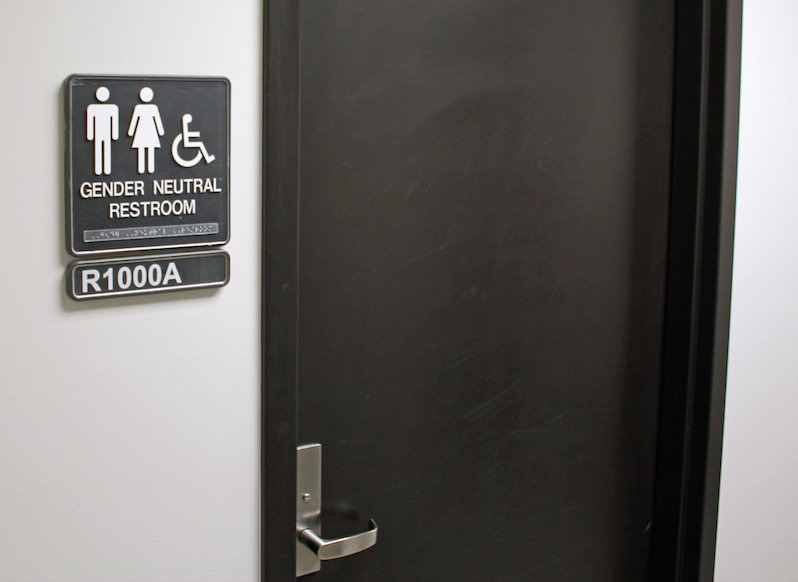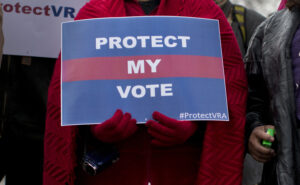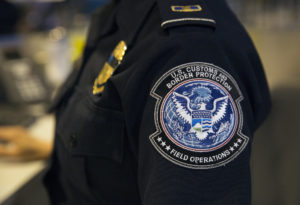North Carolina: Flush Your Bathroom Bill Down the Toilet
The bathroom ban is a symptom of systemic, institutionalized discrimination against transgender people. Jeffrey Beall / Flickr (CC-BY-SA)
Jeffrey Beall / Flickr (CC-BY-SA)
By Amy Goodman and Denis Moynihan
Opponents call it “the Bathroom Bill.” In a special session last week, the North Carolina state legislature passed HB2, officially called the Public Facilities Privacy and Security Act. Gov. Pat McCrory signed the law that night. The new law denies transgender people use of the bathroom, changing room or locker room that matches their gender identity. Resistance to the bill is fierce, and growing daily.
HB2 was rushed into law in response to the expansion of the anti-discrimination ordinance in Charlotte, North Carolina, passed just over a month ago. The city law added protections for sexual orientation and gender identity. The state law bans local governments from making any such accommodation, rendering Charlotte’s inclusive ordinance illegal. Similar bills have been put forth in states “from Washington state to Virginia (and everywhere in-between),” writes Chase Strangio, a staff attorney at the American Civil Liberties Union.
“The larger context in which these laws are playing out is deeply disturbing,” Strangio told us on the “Democracy Now!” news hour. “The North Carolina law is almost a greatest hits of all of the terrible things we’ve seen in the almost 200 bills that have been introduced targeting LGBT people this year.”
The ACLU has filed suit challenging the constitutionality of HB2. “You pass an unconstitutional law Wednesday night, we’re going to sue you on Monday morning,” Strangio said. We spoke with one of the plaintiffs in the federal lawsuit, Payton McGarry, a 20-year-old sophomore at the University of North Carolina at Greensboro — the site of the legendary Woolworth lunch counter sit-ins against segregation in 1960.
Of the immediate impact on his life, McGarry said, “It’s requiring me to use the female restroom … this is distressing because I used the female restroom until it was not feasible for me to, until I was getting pushed, shoved, slapped, screamed at every time I went into a female bathroom.” Strangio concurred: “It means that trans people are now completely unable to participate in public life, because trans people have no idea where they’re supposed to go to the bathroom.”
The bathroom ban is a symptom of systemic, institutionalized discrimination against transgender people. Last year, more transgender people were murdered in the United States than in any previous year. In particular, Chad Griffin, president of Human Rights Campaign, writes, “transgender women of color are facing an epidemic of violence that occurs at the intersections of racism, sexism and transphobia.” A survey of 6,450 people in the U.S. who identify as transgender, conducted by the National LGBTQ Task Force and the National Center for Transgender Equality, found that respondents were four times more likely to live in poverty than the average American. A stunning 41 percent had attempted suicide.
As HB2 became law, Charlotte marked the one-year anniversary of the suicide of Blake Brockington, the first transgender high school homecoming king in North Carolina. In a video shot before his death, 18-year-old Brockington said, “I grew up in Charleston, South Carolina, in a Southern Baptist home. I’ve always been kind of different, and it was always a bad thing in my family. … And it’s been really hard. High school has been really hard.” On being crowned homecoming king, he said, “It made me feel like, for once, I could just be … a normal teenage boy just doing normal teenage guy things, like being homecoming king.”
North Carolina’s attorney general, Roy Cooper, who is running for governor against Pat McCrory, announced he would not defend the new law in court. More than 90 major corporate CEOs, including those from Apple, Google, Facebook, Marriott International and Charlotte-based Bank of America, have signed a letter to Gov. McCrory saying: “We are disappointed in your decision to sign this discriminatory legislation into law. The business community, by and large, has consistently communicated to lawmakers at every level that such laws are bad for our employees and bad for business.” The NBA said it may pull its 2017 All-Star Game from Charlotte. Facing comparable pressure in Georgia, Republican Gov. Nathan Deal vetoed a similar bill this week.
Payton McGarry sees hope in the reaction, both on his own campus and around the country: “This is really bringing people together and making people realize that this is a threat to our movement to accept each other and our movement to love each other.”
Let’s celebrate love, acceptance and equality. Take American politics out of the toilet.
Amy Goodman is the host of “Democracy Now!,” a daily international TV/radio news hour airing on more than 1,300 stations. She is the co-author, with Denis Moynihan, of “The Silenced Majority,” a New York Times best-seller.
(c) 2015 Amy Goodman
Distributed by King Features Syndicate
Your support matters…Independent journalism is under threat and overshadowed by heavily funded mainstream media.
You can help level the playing field. Become a member.
Your tax-deductible contribution keeps us digging beneath the headlines to give you thought-provoking, investigative reporting and analysis that unearths what's really happening- without compromise.
Give today to support our courageous, independent journalists.









You need to be a supporter to comment.
There are currently no responses to this article.
Be the first to respond.